The GloFAS Community Workshop – Supporting the Integration of Global Flood Forecasts Locally
By Rebecca Emerton, Liz Stephens and Hannah Cloke
Workshop participants from SENAMHI (Peru), the Red Cross/Red Crescent Climate Centre (U.S., Peru and London), the Mozambique Red Cross, the Belize Hydromet Service, the Xiamen Weather Service Centre, JRC, ECMWF and the University of Reading.
On the 4th of May, delegates from across the world gathered at the University of Reading for the first Global Flood Awareness System (GloFAS) community workshop, aimed at supporting the integration of GloFAS forecasts into existing national and local forecasting capabilities. The workshop, led by Professor Hannah Cloke and Dr. Liz Stephens, included seminars, practical activities and discussion sessions.
Liz and Hannah
Participants of the full three-day workshop attended from the Servicio Nacional de Meteorología e Hydrología del Perú (SENAMHI), the Red Cross/Red Crescent Climate Centre (U.S., Peru and London), the Mozambique Red Cross, the Belize Hydromet Service, the Xiamen Weather Service Centre, the European Commission Joint Research Centre (JRC), the European Centre for Medium-Range Weather Forecasts (ECMWF) and the University of Reading.
First-day open event attracted a large crowd
Sir David Bell, University of Reading
The event kicked off with an afternoon of seminars, attended by forecasters, academics, policy-makers and decision makers from far and wide. The introductory remarks were given by Professor Hannah Cloke, before handing over to Sir David Bell, the Vice Chancellor of the University of Reading, who warmly welcomed everyone to the beautiful University of Reading and introduced the connections with institutions such as ECMWF and the Red Cross/Red Crescent Climate Centre, and the interdisciplinary research at the University that led to this event.
Florence Rabier, ECMWF
Dr. Florence Rabier, the director of the ECMWF, gave the first keynote presentation, providing an insight into the role of the ECMWF and its forecasts, and how GloFAS came to be. The second keynote was given by Dr. Nicola Ranger from the UK’s Department for International Development (DFID), who discussed how DFID make use of forecasts, both directly and indirectly.
Nicola Ranger, DFID
Further presentations were given by Erin Coughlan de Perez from the Red Cross / Red Crescent Climate Centre, Professor Ros Cornforth, the director of the Walker Institute, and Dr. Peter Salamon, the GloFAS project manager at the JRC. Erin’s presentation, entitled “Think globally, act locally?”, discussed how GloFAS, a global scale flood forecasting system, can be applied at the local scales at which the Red Cross / Red Crescent Societies often operate. An example was highlighted where Forecast-based Financing, an initiative which aims to distribute humanitarian funding ahead of a natural disaster, was successful ahead of floods in Uganda in late 2015 based on GloFAS forecasts.
Listening intently to talks
Ros went on to discuss “Making forecasts matter”; how science can be used to help by breaking down academic borders and working together with communities, policymakers and forecasting services. The AMMA Forecasters’ Handbook, a guide for operational forecasting in West Africa, was discussed as an example; a significant project developed through collaboration between researchers and forecasters, to include long-used local forecasting knowledge alongside new research and techniques.
Peter Salamon, JRC
In the last talk of the afternoon, Peter provided insight into the technical aspects of GloFAS, and how the system can be used to support flood risk management globally. Peter began by stating that the principal objectives of GloFAS are to provide added, complementary value for national emergency response services and support international organisations and global actors.

Discussion during the poster session
During the evening, participants had the chance to present posters, and both the seminars and posters provided a platform for many lively discussions and a brilliant end to the day.
Two days of GloFAS workshop
The following two days focused on the use and integration of GloFAS forecasts, beginning with presentations from each participant on forecasting practices in their country or region, and their own role and experiences. Training sessions were provided by Hannah Cloke on ensemble forecasting and hydrological modelling, and specifically on the GloFAS interface and forecasts by Peter Salamon.

Ervin Zsoter, ECMWF explaining GloFAS initialisation
The workshop also involved plenty of interactive sessions led by Liz Stephens, Ervin Zsoter (ECMWF), Hannah Cloke, and PhD students Louise Arnal and Rebecca Emerton. These sessions provided hands-on training for participants on how to access and interpret the output of GloFAS forecasts by plotting the data using various different visualisations; evaluating GloFAS forecasts, during which users were able to calculate and plot various different skill scores, for example, to evaluate GloFAS in several different regions and river basins; and post-processing of forecasts, led by Ervin Zsoter (with thanks also to Paul Smith [ECMWF]), which saw participants using bias correction techniques to analyse forecast uncertainty, and attempt to improve the forecasts.
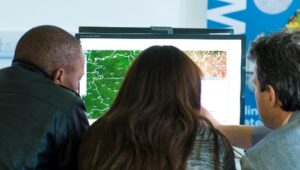
Examining GloFAS output
This workshop provided an excellent opportunity for forecasters, decision-makers, researchers and model developers to work and learn together. While the aim of the workshop was to support the integration of GloFAS forecasts into local capabilities, alongside the training given, the model developers and researchers gained a valuable insight into the needs of the forecast users, and everyone was able to learn something from working together with other members of the GloFAS community.
This workshop was funded by the GFDRR/DFID Challenge Fund and a research impact award made by NERC to Professor Hannah Cloke, with further support from the University of Reading and the Walker Institute.

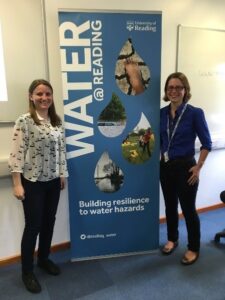
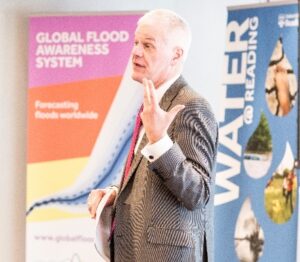
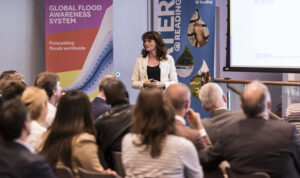
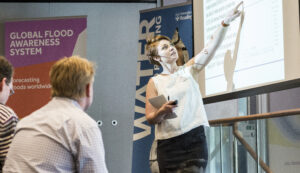
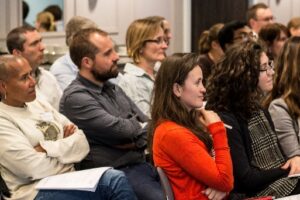
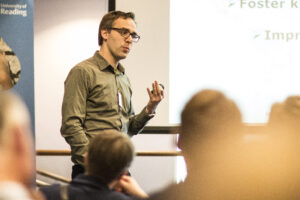
0 comments